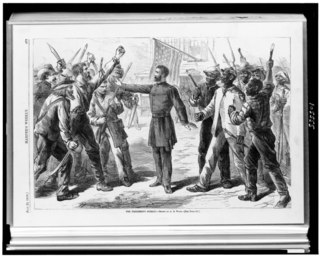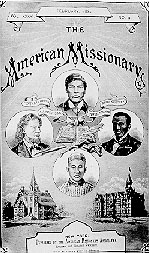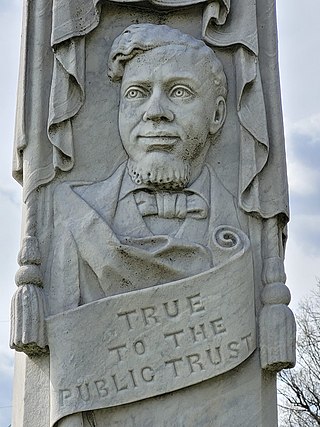Related Research Articles

The Bureau of Refugees, Freedmen, and Abandoned Lands, usually referred to as simply the Freedmen's Bureau, was a U.S. government agency of early post American Civil War Reconstruction, assisting freedmen in the South. It was established on March 3, 1865, and operated briefly as a federal agency after the War, from 1865 to 1872, to direct "provisions, clothing, and fuel...for the immediate and temporary shelter and supply of destitute and suffering refugees and freedmen and their wives and children".

Clark Atlanta University is a private, Methodist, historically black research university in Atlanta, Georgia. Clark Atlanta is the first Historically Black College or University (HBCU) in the Southern United States. Founded on September 19, 1865 as Atlanta University, it consolidated with Clark College to form Clark Atlanta University in 1988. It is classified among "R2: Doctoral Universities – High research activity".

The American Missionary Association (AMA) was a Protestant-based abolitionist group founded on September 3, 1846 in Albany, New York. The main purpose of the organization was abolition of slavery, education of African Americans, promotion of racial equality, and spreading Christian values. Its members and leaders were of both races; The Association was chiefly sponsored by the Congregationalist churches in New England. The main goals were to abolish slavery, provide education to African Americans, and promote racial equality for free Blacks. The AMA played a significant role in several key historical events and movements, including the Civil War, Reconstruction, and the Civil Rights Movement.
The John F. Slater Fund for the Education of Freedmen was a financial endowment established in 1882 by John Fox Slater for education of African Americans in the Southern United States. It ceased independent operation in 1937, by which time it had disbursed about $4,000,000.

James D. Lynch was a missionary, public official, and state legislator in the United States. He was the first African-American Secretary of State of Mississippi, and a minister.

This is a selected bibliography of the main scholarly books and articles of Reconstruction, the period after the American Civil War, 1863–1877.
Summerhill is a neighborhood directly south of Downtown Atlanta between the Atlanta Zoo and Center Parc Stadium. It is bordered by the neighborhoods of Grant Park, Mechanicsville, and Peoplestown. Established in 1865, Summerhill is one of Atlanta’s oldest neighborhoods and part of the 26 neighborhoods making up the Atlanta Neighborhood Planning Unit system.
Walden University was a historically black college in Nashville, Tennessee. It was founded in 1865 by missionaries from the Northern United States on behalf of the Methodist Church to serve freedmen. Known as Central Tennessee College from 1865 to 1900, Walden University provided education and professional training to African Americans until 1925.
Education in Tennessee covers public and private schools and related organizations from the 18th century to the present.

Erastus Milo Cravath (1833–1900) was a pastor and American Missionary Association (AMA) official who after the American Civil War, helped found Fisk University in Nashville, Tennessee, and numerous other historically black colleges in Georgia and Tennessee for the education of freedmen. He also served as president of Fisk University for more than 20 years.
The civil rights movement (1865–1896) aimed to eliminate racial discrimination against African Americans, improve their educational and employment opportunities, and establish their electoral power, just after the abolition of slavery in the United States. The period from 1865 to 1895 saw a tremendous change in the fortunes of the Black community following the elimination of slavery in the South.

Henry McNeal Turner was an American minister, politician, and the 12th elected and consecrated bishop of the African Methodist Episcopal Church (AME). After the American Civil War, he worked to establish new A.M.E. congregations among African Americans in Georgia. Born free in South Carolina, Turner learned to read and write and became a Methodist preacher. He joined the AME Church in St. Louis, Missouri, in 1858, where he became a minister. Founded by free blacks in Philadelphia, Pennsylvania, in the early 19th century, the A.M.E. Church was the first independent black denomination in the United States. Later Turner had pastorates in Baltimore, Maryland, and Washington, DC.

First Congregational Church is a United Church of Christ church located in downtown Atlanta at the corner of Courtland Street and John Wesley Dobbs Avenue .The church has had many prominent members over the years including including Alonzo Herndon and Andrew Young. First Congregational Church welcomes people from all racial and economic backgrounds and has a prominent music ministry. The current senior ministor, Dr. Reverend Dwight Andrews, is also a professor of music at Emory University.

William H. Crogman was a pioneering African American educator and classicist at Clark University of Atlanta in the United States. The William H Crogman School in Atlanta is named for him.

Edmund Asa Ware was an American educator and the first president of Atlanta University, serving from 1869 to 1885.

William Jefferson White was an American civil rights leader, minister, educator, and journalist. He was the founder of Harmony Baptist Church in Augusta, Georgia in 1869 as well as other churches. He also was a co-founder of the Augusta Institute in 1867, which would become Morehouse College. He also helped found Atlanta University and was a trustee of both schools. He was a founder in 1880 and the managing editor of the Georgia Baptist, a leading African American newspaper for many years. He was an outspoken civil rights leader.

Haven Institute and Conservatory of Music, also known simply as Haven Institute, was an American private historically black Methodist college active from 1865 until the early-1930s, located in Meridian, Mississippi. It was founded in 1865 by Moses Austin, a pastor of the Saint Paul Methodist Episcopal Church of Meridian and a formerly enslaved person. Originally it was called Meridian Academy and it was located at 27th Avenue and 13th Street in Waynesboro, Georgia, however the name changed in 1914 and the campus moved in 1921.

The Colored American published in Augusta, Georgia, from October 1865 to February 1866. It was the first African American newspaper in the South. The paper was founded by John T. Shuften, who was forced to sell the paper within six months due to a lack of financial support. The paper was published by John T. Shapiro. The Colored American covered political, religious, and general news. Shuften published the newspaper with assistance from James D. Lynch. The paper was purchased in January 1866 by the Georgia Equal Rights Association, and the name was changed to the Loyal Georgian, published by John Emory Bryant.

Freedmen's Schools were educational institutions created soon after the abolition of slavery in the United States to educate freedmen. Due to the remaining opposition to equality between blacks and whites, it was difficult for the formerly enslaved to receive a proper education, among a myriad of other things. Schools were made especially for blacks but were open to anyone regardless of race. These schools were far from perfect; however, they did give African Americans hope and opportunity for their future.
References
- ↑ "Collection: Frederick Ayer records | Archives Research Center". findingaids.auctr.edu. Atlanta University Center Robert W. Woodruff Library. hdl:20.500.12322/fa:015 . Retrieved 10 May 2021.
- ↑ Clarence Albert Bacote (1969), The Story of Atlanta University: A Century of Service, 1865-1965, Atlanta: Atlanta University, p. ix, 449 p., LCCN 74013298, OCLC 80795, OL 5051763M, Wikidata Q106782974
- ↑ "Booker T. Washington High School: Education Flagship for the People". Building Memories. Archived from the original on 28 November 2020. Retrieved 10 May 2021.
- ↑ Sisk, Glenn (1964). "The Negro Colleges in Atlanta". The Journal of Negro Education. 33 (2): 131–135. doi:10.2307/2294579. ISSN 0022-2984. JSTOR 2294579 . Retrieved 10 May 2021.
- ↑ "HISTORIC SUMMERHILL". Organized Neighbors of Summerhill. 9 September 2015. Archived from the original on 21 January 2021.
- ↑ Garrett, Franklin M. (June 1969). Atlanta and Environs: A Chronicle of Its People and Events, 1820s-1870s. University of Georgia Press. ISBN 978-0-8203-0263-8 . Retrieved 10 May 2021.